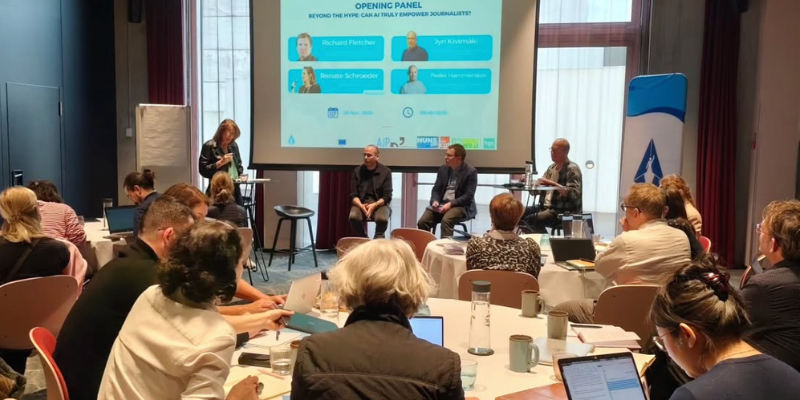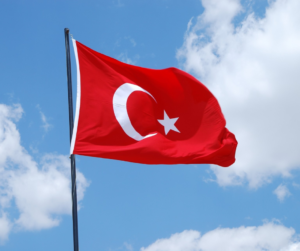The European Federation of Journalists (EFJ) on 6-7 November 2025, the fifth Stand Up for Journalism workshop aimed to discuss the impact of Artificial Intelligence (AI) in journalism, addressing youth and unions’ strength in shaping the future of the profession.
The event took place in Copenhagen, Denmark, currently holding the presidency of the Council of the European Union. Torsten Asbjørn Andersen, Deputy Permanent Secretary at the Ministry of Culture, opened the workshop with his keynote speech on the Copenhagen Declaration that was signed on 4 November on the importance of independent media and culture in Europe (1).
It is expected that more and more people will turn to AI as their go-to way of consuming news. Studies on AI conducted by the Reuters Institute show that weekly use of AI for news has doubled in a year, from 3% to 6%. Still relatively low, this figure is likely to rise rapidly in the coming years across Europe. Presenting the latest findings, Reuters Institute’s Research Director Richard Fletcher noted that at this stage, AI is mainly used by citizens as a help to better understand the news.
On the journalists’ side, AI is now widely used in newsrooms for tasks such as research, translation, summarisation, and editorial support. As its role in content production continues to grow, a key question emerges: will audiences eventually be willing to pay for content created entirely by AI? Innovation coach at the Finnish public broadcaster YLE, Jyri Kivimäki, stressed the need to clearly differentiate AI-generated content from content created by journalists. He argued that machines can’t produce what people want to find in news, namely “context, interviews and expert opinions”.
As AI in newsrooms is reshaping the journalistic working environment across Europe, panel discussions between organisations’ representatives and experts led to five main take-aways: defining newsroom guidelines on the use of AI, providing training on the use of AI for all journalists, ensuring a fair and equal playing field for all stakeholders, building trust in the media, and building alliances across the industry. To work toward these ends, cooperation between unions, academics, publishers and journalists is necessary.
Unions’ actions to protect workers’ rights
Unions have a duty to support workers in the transition with AI. Measures must be taken to promote collective bargaining and mobilisation. Matthias von Fintel, lead negotiator for the German trade union ver.di, presented ver.di’s landmark collective agreement covering more than 25,000 freelance workers in the film industry in Germany. He hopes that this agreement can be replicated in the media industry.
The importance of training has been widely stressed for all journalists, not only in those newsrooms with financial resources. “The most important is that professionals have to be accompanied with guidelines to know what they should do with the tools”, stated Hélène-Rauby Matta, Business development manager at the EBU Academy’s school of AI. Journalist, trainer and AI expert Ute Korinth also emphasised the impact of AI on mental health, highlighting the growing pressure on freelancers, expected to work faster without accessing newsroom AI tools.
The fear of being replaced by AI is widespread, and does not only concern the young generation of journalists, argued Felicia Malmqvist, Recruitment manager at the Swedish Association of Journalists. When asked about a potential “generational gap” in AI use, some participants responded that no such gap exists. Instead, they highlighted a general lack of training and ethical guidelines in newsrooms. Aferdita Lukaj, a young TV journalist in Kosovo, uses AI to be faster and more creative in her work but does not have clear guidance from leadership on how to use the technology. “It’s an open secret that everyone uses it,” she said.
The importance of information integrity for our democracies in the age of AI was a key theme of the workshop. Independent media researcher and writer Alexandra Borchardt gave a training session on how journalism and newsrooms are being affected by digital transformation and AI. “We all need information integrity, our democracies too. And we all need to work on this together,” she said.
AI and policy
European institutions have been looking at this topic in the past year. “Even though the legislative route at the moment in the EU might not at all times seem that rosy, much can still be taken forward on the collective bargaining level. And much is being done, so no need to re-invent the wheel. Just join together, learn and share!” said Johannes Antilla, Policy Advisor at the European Parliament, adding that there are already many existing legal bases addressing technological changes.
José Guimarães, Executive Director at the European Newspapers Publishers Association (ENPA), stated that publishers consider that “existing rules do not provide neither transparency nor accountability”, while those are essential for the survival of journalism. In the current geopolitical context, further measures on the protection of authors’ rights are needed to ensure European digital sovereignty. The European regulatory framework must be strengthened in the light of safeguarding news integrity and the European media ecosystem, with the increase of the visibility and dissemination of European journalistic content to end-users.
Finally, the EFJ presented its position on Artificial Intelligence in Journalism, outlining how AI should be regulated within newsrooms to ensure that AI strengthens journalism instead of undermining it.
(1) The declaration is supported by 26 of the 27 EU countries, as well as the United Kingdom, Ukraine, Iceland, Norway, and Switzerland. Only Hungary chose not to support it.
Stand Up for Journalism is a 18-month project led by the EFJ and implemented with its partners: Independent Journalists’ Association – NUNS (Serbia), Trade Union of Media of Montenegro – TUMM (Montenegro), Danish Journalists’ Union – DJ (Denmark), Turkish Journalists’ Union – TGS (Turkey), Syndicat National des Journalistes – SNJ-CGT (France) and Association des Journalistes Professionnels – AJP (Belgium)
T![]() his project is co-funded by the European Union. Views and opinions expressed are however those of the author(s) only and do not necessarily reflect those of the European Union. Neither the European Union nor the granting authority can be held responsible for them.
his project is co-funded by the European Union. Views and opinions expressed are however those of the author(s) only and do not necessarily reflect those of the European Union. Neither the European Union nor the granting authority can be held responsible for them.
Source: EFJ




